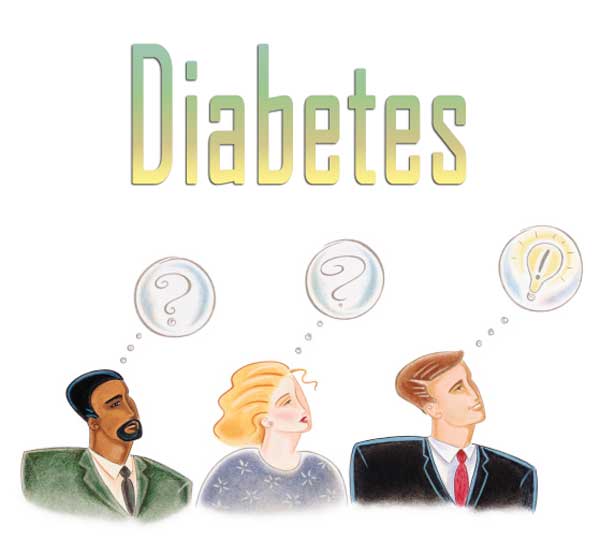Read on for answers to some common questions asked by people with diabetes.
Q Why is diabetes so common today?
APeople are getting type 2 diabetes at younger ages—even children. No one really knows why, but part of the problem is that as a country we are heavier and less physically active than ever before.
Q What is prediabetes?
AIf you have prediabetes, your blood glucose levels are higher than normal but not quite high enough to be diagnosed with diabetes. Prediabetes needs to be taken seriously. People with prediabetes are at high risk for heart disease and type 2 diabetes.
Q Is type 2 more serious than type 1 diabetes?
AThat depends on what is meant by more serious. It is true that all people with type 1 diabetes need to take insulin, so type 2 may seem easier to manage. Although many people with type 2 diabetes can manage their diabetes with healthy eating, being active and taking oral medicines, many also take insulin. Both types of diabetes, if not managed, can damage many parts of the body, such as the heart, blood vessels, eyes and kidneys.
Q If nobody in my family has diabetes, why did I get it?
ANo one really knows for sure. What we do know is that the risk for diabetes is related to both your genes and your environment, which includes lifestyle. It also could be that one of your family members had diabetes in the days before it was diagnosed as easily, so they may not have known. Or it may be that the person who passed down the risk to you died of something else before he or she got diabetes. But by helping your children and grandchildren stay at a healthy weight and be active, you may be both the first and the last person with diabetes in your family.
Q Why does my treatment for type 2 diabetes keep changing?
AThere are two reasons. One is that as more is learned about diabetes and new medicines are discovered, your healthcare provider may suggest a new treatment for you. The other reason is that over time, your body makes less and less insulin. You continue to make some insulin but not enough to keep your blood glucose in the target range. As you make less insulin, your body needs more help to keep your blood glucose where it needs to be. So it is common to add diabetes pills, insulin or other types of injectable medicines as time goes by. This does not mean that you have failed to manage your diabetes well. It just means that your treatment needs to change to keep up with your needs.
Q What can I do to keep weight off once I lose it?
AIt is true that it is harder to keep weight off than it is to lose it. When you cut back on calories, your body may respond by slowing down your metabolism so that you use your calories better. This is called the “set-point theory” and it helped to keep people from starving years ago at times when food was more scarce. This also means that people who diet to reach a certain weight will need fewer calories to maintain that weight than someone who has always been at the very same weight. Although most of us think that once we lose weight, we don’t have to think about what we eat anymore; that’s not true. Keeping weight off takes work, as well. There are some things you can do that will help.
Because you most likely have several types of questions, it is a good idea to add them to a list as you think of them. Your doctor, nurse, dietitian or Costco pharmacist are all good sources of health information.


